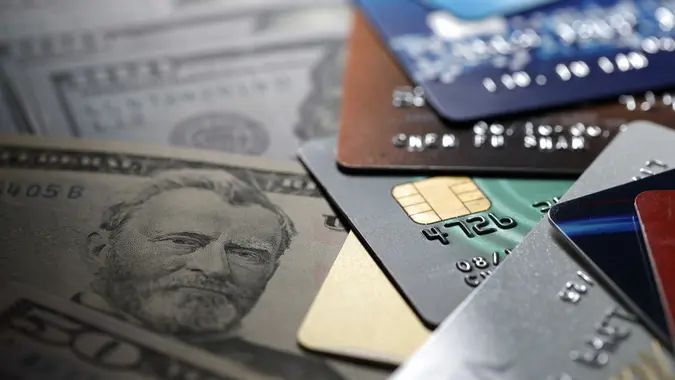How To Use a Credit Card the Right Way, According to Money Expert Seth Godwin

Commitment to Our Readers
GOBankingRates' editorial team is committed to bringing you unbiased reviews and information. We use data-driven methodologies to evaluate financial products and services - our reviews and ratings are not influenced by advertisers. You can read more about our editorial guidelines and our products and services review methodology.

20 Years
Helping You Live Richer

Reviewed
by Experts

Trusted by
Millions of Readers
Credit cards are a part of the American way of life. Anyone who would like to buy a house one day will likely need to build their credit history using a credit card to get approved for a loan and secure better rates.
However, credit card debt has become a massive problem in the U.S. As of the second quarter of 2024, U.S. residents have a reported grand total of $1.14 trillion in credit card debt. That’s the highest it has ever been. The number of people unable to pay their credit card balances has also been steadily rising since 2021, with 3.16% of credit cards currently delinquent compared to 1.54% in 2021, according to Federal Reserve Economic Data.
Personal finance guru Seth Godwin has some simple advice for how to get the credit score benefits of using a credit card safely. He says you should pay off your credit card balance every week. If you find that you cannot regularly do that on a card, then you should get rid of it. Here are his five reasons why paying off your cards weekly is the best approach.
Always Pay On Time
If you pay your balance weekly, then you can make sure that you can always pay off your credit card before the due date. Your payment history is the most significant factor affecting your credit score. According to Experian, how you pay off your credit card accounts for 35% of your score.
Godwin says that a single missed payment can drop your score by 50 points or more. If you settle your credit card bill weekly, you’re greatly reducing the risk of missing a payment and keeping your score safe from accidental dips.
Maintain Low Credit Utilization
Credit utilization is a metric used by banks to describe how much of your available credit you actually use. If you have just one credit card with a limit of $10,000, then a balance of $3,000 means you have a credit utilization of 30%. Your credit utilization is calculated by combining all of the limits and balances listed in your credit report.
According to Godwin, your credit utilization should ideally stay below 10% to boost your credit score. Paying off your balance weekly makes sure that your balance remains low relative to your limits. Check your credit report to see exactly what your limits are so you don’t accidentally use more of your credit than you want to. If you have multiple credit cards, you may also want to spread your expenses among them so that you don’t have any cards with a high individual utilization rate, as that may also affect your final score.
Experian has provided average credit utilization rates for various FICO credit score ranges”
- 300-579 (Poor) — 82.1%
- 580-669 (Fair) — 56.1%
- 670-739 (Good) — 35.2%
- 740-799 (Very good) — 14.7%
- 800-850 (Exceptional) — 6.5%
Be Aware of How Much You’re Spending
Studies have shown that people are more likely to spend more when using credit compared to cash. According to a study from the MIT Sloan School of Management and the University of Utah, people treat paying by card differently than they do counting out coins and bills. Paying with credit appears to put the cost of the purchase out of mind for the buyer and may release dopamine in the brain, while paying with cash does not. All in all, it means that you may have a harder time keeping track of your purchases and budget if you use your credit card for most of your spending.
By paying off credit weekly, you’re checking in on your spending regularly, which means it may be easier to save and adjust your spending habits. If you’re spending more than you planned to in a certain category, you can catch it early instead of at the end of the month.
Never Pay Interest
If your balance carries over to the next month past the due date, you will get charged interest. Interest rates on credit cards can be steep, and you may end up paying much more over time for your purchases than they actually cost.
This is one of the main pitfalls of credit cards, and it can create a snowballing cycle of debt that can be hard to escape. Godwin points out that by clearing your balance weekly, you effectively avoid these charges.
Maximize Reward Benefits
Many consumers are drawn to credit cards for the rewards — cash back, points or miles. The problem is that any interest paid can quickly cost you more than you get from these benefits. However, if your balance is paid regularly and no interest accumulates, all rewards gained are a net benefit.
It’s a win-win — you get a good credit score, and you also receive the most value from your cards.
 Written by
Written by  Edited by
Edited by 
























